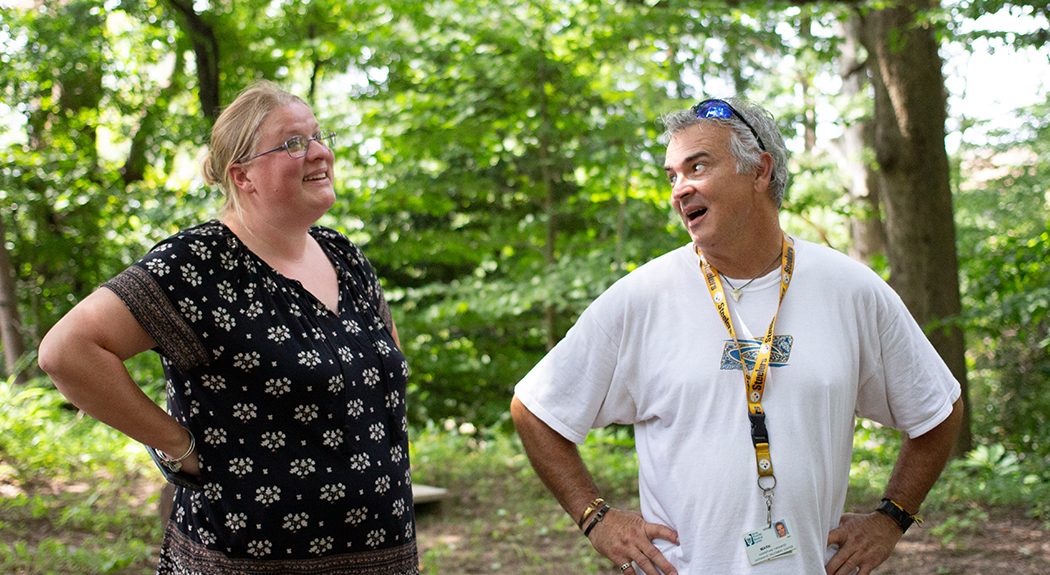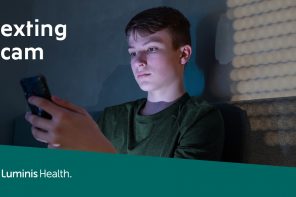Abby Forbes was in drug rehabilitation for the second time when she had to overcome an unexpected hurdle.
By the time she was in her mid-twenties, Abby had been battling addiction for nearly a decade. She began consuming alcohol at 15, drinking to the point of blacking out. She later began experimenting with marijuana and ecstasy before moving on to heroin.
Her addiction led her to Pathways, Anne Arundel Medical Center’s drug and alcohol treatment facility, where she was determined to get clean for good.
But a new obstacle stood in her way. This time, it was in the form of adventure therapy, Pathways’ hands-on outdoor activities course designed to challenge patients’ problem-solving skills.
Abby remembers standing on a wooden platform with about 15 other people. Each person had to climb up a rope and swing to another platform several yards away.
As Abby struggled with the rope, the others tried to help. Still, she was determined to do it herself, insisting to the group that she could handle it despite falling twice.
Mark Sakraida, Pathways’ adventure therapy coordinator, walked over to her. His words remain clear in Abby’s mind, 16 years later.
“How is that like recovery?” he asked her.
It was as if a lightbulb went on in Abby’s mind.
“I learned to ask for help,” she says.
“I couldn’t do it alone”
Abby first came to Pathways in 2000, after her parents had kicked her out of their home.
“I was in a very child-like state,” she recalls. “I wanted what I wanted, when I wanted it.”
She briefly moved in with a boyfriend, living in his family’s basement in squalid conditions. After a few days, she called her parents. They told her she could come back home – as long as she went to rehab.
She remembers having a chip on her shoulder the first day at Pathways, though she felt better after receiving treatment for drug withdrawal symptoms.
Abby stayed at Pathways for 15 days. She loved the supportive community there, but didn’t know what to expect upon being discharged.
“I was scared,” she says. “I left with knowledge of coping skills. And then it somehow evaporated.”
Abby says she got back in touch with other users, and fell back into her old habits. Seven months later, she returned to Pathways.
This time, she was in a different place mentally.
“I wasn’t as nervous. I was excited about who I was going to meet and learn from,” she says.
Abby had been through adventure therapy when she was at Pathways the first time, when she learned the importance of teamwork.
Yet it wasn’t until she was back for a second round, standing on that platform and working hard to climb up the rope, that the lessons hit home.
“I couldn’t do it alone,” she says.
READ MORE: The benefits of play: Why the playground is essential to a child’s development
The benefits of adventure therapy
Now 42, Abby has been sober since 2001. She works as a peer support specialist with the Anne Arundel County Department of Health, connecting addicts with community resources such as Pathways.
Abby says Pathways gave her a strong foundation that has served as the basis for her successful recovery.
She regularly attends 12-step meetings, where she met her husband. And she’s still not afraid to ask for help when she needs it.
Mark, who has served as adventure therapy coordinator since 1994, cites an ancient Chinese proverb when explaining why adventure therapy works.
“Tell me, I’ll forget. Show me, I’ll remember. Involve me, I’ll understand,” he says. “I tell patients that my job is to take them out of their comfort zone – and I think I do a pretty good job of that.”
More than a decade and a half after leaving Pathways, Abby finally got the chance to thank Mark.
She was at a work meeting at Pathways this summer when she walked past him in the hallway. She stopped and told him how she still thinks about the lessons she learned so many years ago.
“He has a special place in my heart,” Abby says.
Mark says he relishes every chance he gets to give his patients a dose of Vitamin A – “pure adrenaline.”
“Every day I do this is a blessing,” he says.
Ask questions, find resources and learn more at askAAMC.org/HealthyMinds.




